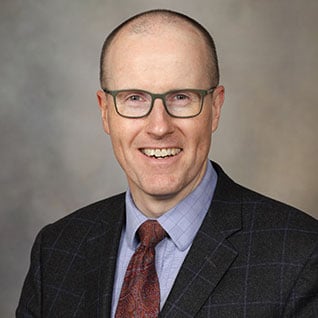Department and Faculty
/prod01/channel_2/media/mccms/content-assets/academics/residencies-and-fellowships/neurosurgical-oncology-fellowship-mn/3404986_0021_faculty-1024X512.jpg)
Department and Faculty
The Department of Neurosurgery at Mayo Clinic in Rochester, Minnesota, is one of the largest and most highly regarded in the United States. Each year, the entire spectrum of neurosurgical conditions and disease is treated essentially at one site, which ensures an unparalleled training experience. The department performs approximately 5,000 neurosurgical procedures each year.
This case load includes more than 1,200 adult brain tumor procedures each year. Many cases are straightforward neurosurgical oncology problems. This allows you to become skilled in the management of typical neurosurgical oncology problems. However, many complex cases also are referred to Mayo Clinic neurologists and neurosurgeons for evaluation and treatment. These difficult cases often require a multidisciplinary team approach to patient care, which broadens your educational opportunities.
From the program director
 The Neurosurgical Oncology Fellowship at Mayo Clinic in Rochester, Minnesota, is a one-year clinical fellowship designed to give graduates of neurosurgical training programs that are accredited by the Accreditation Council for Graduate Medical Education (ACGME) or international equivalent advanced experience in the diagnosis and management of the full spectrum of adult intra-axial brain tumors. Applicants should have a strong interest in becoming a leader in academic neurosurgical oncology working to improve outcomes for patients with these challenging tumors.
The Neurosurgical Oncology Fellowship at Mayo Clinic in Rochester, Minnesota, is a one-year clinical fellowship designed to give graduates of neurosurgical training programs that are accredited by the Accreditation Council for Graduate Medical Education (ACGME) or international equivalent advanced experience in the diagnosis and management of the full spectrum of adult intra-axial brain tumors. Applicants should have a strong interest in becoming a leader in academic neurosurgical oncology working to improve outcomes for patients with these challenging tumors.
The neurosurgical practice at Mayo Clinic Rochester is one of the largest in the country — this high clinical volume allows fellows to get extensive experience with both simple and complex neurosurgical oncology cases, intra-operative MRI, awake craniotomy and electrophysiological mapping, and radiosurgery, as well as experience in outpatient management of these patients.
The year will be spent working closely with me and my colleagues, Dr. Terence C. Burns and Dr. Bruce E. Pollock. We have a multidisciplinary approach to neurosurgical oncology and work very closely with colleagues in neuro-oncology, radiation oncology, medical oncology, skull base surgery, interventional and diagnostic radiology, and neuropathology.
We expect that fellows will become experts in neurosurgical oncology decision-making and procedural skills over the continuum of simple to complex cases. Similarly, we want to learn from fellows the insights they have gained over the course of the neurosurgical training to date. Together, we think this will be a full and rewarding year with superb clinical experience and academic opportunities.
Ian Parney, M.D., Ph.D.
Neurosurgical Oncology Fellowship Director
Faculty
In addition to caring for patients in their clinical practices and carrying out their research programs, Mayo Clinic's campus in Rochester is made up of 21 clinical and three research faculty members who are committed to teaching and facilitating the fellow's development as a neurosurgeon. Many of the department faculty have published and lectured extensively and are well-regarded for their specialty and subspecialty expertise.
Core faculty members for the Neurosurgical Oncology Fellowship include:
Visiting professors
Many prominent neurosurgeons and other physicians and scientists focused on neuro-oncology visit Mayo Clinic each year. They present their work at scheduled conferences or morning lectures and participate in hospital rounds. These visits are scheduled to include time for informal interaction between the visitor and residents and fellows.
Facilities
Fellowship activities are carried out primarily at Mayo Clinic Hospital — Rochester, Saint Marys Campus, for inpatient activities, and the Gonda Building for outpatient activities. The Department of Neurological Surgery typically has 10 or more first-start operating rooms available daily. Facilities include a high field (3 Tesla) intra-operative MRI and a Perfexion Gamma Knife radiosurgery unit.